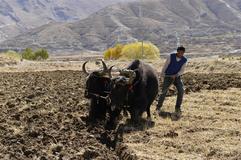2014 Yearender: highlights for female Tibetans

Drolma Traditional Ethnic Costume Weaving Factory is located in a small building with unique Tibetan style in the Gadong Town of Bainang County, Shigatse Prefecture of southwest Tibet Autonomous Region. [Photo/China Tibet Online]
1. Fiscal polices
With support from the Tibet Branch of the Agricultural Bank of China (ABC), the Drolma Traditional Ethnic Costume Weaving Factory, established by 37-year-old Pasang Drolma, obtained a loan of 200,000 yuan (32,280 USD) to hire engineers and build new workshops. The 45 employees are all women and the factory has earned revenue over 800,000 yuan (129,040 USD) every year with an annual profit above 200,000 yuan (32,280 U. S. dollars). Click here for the full story.

Photo shows the female Tibetan workers weaving Tibet wool in Shigatse Prefecture, southwest Tibet on April 30, 2014. [Photo/Xinhua]
2. Low-interest loans for women in Tibet
The Tibet Branch of ABC also provided financial services for the issues of agriculture, famers, and the rural area. The low-interest loans for urban and rural women have helped the female Tibetan workers in the traditional handicraft industry and other economic fields. Click here for the full story.

Xiaojuan, a female merchant who does the business of bodhi prayer beads and bracelets shows her latest products. [Photo/China Tibet Online]
3. Practitioners in the non-public economy
Xiaojuan, a female merchant whose business is selling bodhi prayer beads and bracelets, is one of the 579,000 practitioners in the non-public economy in Tibet. The entire region's non-public economy has maintained rapid development and its number of practitioners has achieved a year-on-year growth of 13.2 percent. Click here for the full story.

Photo taken on Jan 10 shows the member of CPPCC Tibet committee in ethnic costumes, listening carefully to the working report of the conference. The second session of the 10th Tibet People's Political Consultative Conference opens in Lhasa, capital of Tibet in Jan 8, 2014. [Photo/Xinhua]
4. Members of CPPCC Tibet Committee
The second session of the 10th Tibet People's Political Consultative Conference opened in Lhasa, the capital city of Tibet, on January 8, 2014, with the female members wearing ethnic costumes, listening carefully to the working report of the conference, and actively offering their advice. Click here for the full story.

Photo shows the first flight of Tibet Airlines Co.,LTD. [Photo/Chinanews.com]
5. Flight attendants and pilots in Tibet
The Tibet Airlines Co. Ltd., founded on July 26, 2011, ended Tibet's history without airlines. Since the construction of Tibet's first civil airport in 1955, the Damxung Airport, Tibet's aviation history has told a different story. The female pilots and flight attendants working in Tibet have made important contributions to the development of the region's aviation industry. Click here for the full story.

Photo shows the Tibetan bride. [Photo provided by Xiaoyao Huanglaoxie/tianya.cn]
6. Tibetan bride
The distinctive Tibetan wedding is a reflection of Tibetan ethnic and folk culture. On wedding day, a Tibetan bride and groom will hang up prayer flags, accept hundreds of Khada, exchange rings, free captive animals, and dance and sing to enjoy the happiest day of their lives. Click here for the full story.

Metog looks into the mirror happily after taking out stitches on May 11, 2014. [Photo/Xinhua]
7. Smile of a recovered girl
A young Tibetan girl from a herdsman's family in the Nagqu County of the Tibet Autonomous Region had received a free surgery treatment with the help of cadres and volunteers on May 4, 2014, after she was diagnosed with congenital cleft lip and palate. Now she can smile happily. Click here for the full story.

Qimi Wengmu, female Tibetan hostess working in the Kamba TV of Sichuan Province is awarded the Best TV Show Host with another CCTV hostess in the 10th China Golden Eagle TV Art Festival held in Changsha, Hunan Province on Oct 12, 2014. [Photo/360.cn]
8. Best TV hostess
Qimi Wengmu, a female Tibetan hostess working at Kamba TV of Sichuan Province, won the Best TV Show Host award with another CCTV hostess at the 10th China Golden Eagle TV Art Festival held in Changsha, capital of Hunan Province on Oct. 12, 2014. Click here for the full story.

Sonam Chokyi watches the Qinghai-Tibet Highway while sitting on her motorbike on Sep 21, 2014. The Qinghai-Tibet Highway records its 60 anniversary of opening to traffic in 2014. It has not only bearing the weight of countless staff, goods and materials, but also the dream of numerous people. Reporters from Xinhua Agency interview the people travelling on the Qinghai-Tibet highway, listening to their stories and keeping track of their dreams. [Photo/Xinhua]
9. Pilgrim on the Qinghai-Tibet Highway
Sonam Chokyi, a 28-year-old Tibetan girl from Zadoi County of the Yushu Tibetan Autonomous Prefecture of Qinghai Province, has been driving a motorbike with three other companions since July 21, having made a pilgrimage to Lhasa while accompanying 16 fellow villagers. Every day they walk 5 to 7 kilometers, staying in tents at night. They had been walking on the road for almost two months before arriving at Nagqu. Click here for the full story.

The Tibetan Buddhists have strong beliefs and perseverant spirits. They are willing to walk thousands of miles to worship the holy place of their heart. [Photo provided by Xiaoyao Huanglaoxie/tianya.cn]
10. Tibetan Buddhists
Female Tibetan Buddhists can be a mysterious group in the eyes of Chinese and foreign tourists. Regardless of bad weather and poor environmental conditions, female pilgrims, the same as their male counterparts, begin their journey at their homes and progress towards the Jokhang Monastery in Lhasa, their final destination. They are devoted, compassionate, and optimistic, willing to walk thousands of miles to worship the holy place in their heart.Click here for the full story.
Your Comment
Name E-mailRelated News
-
;
-
-

-
Tibet saw grain and vegetable harvests in 2015
According the most recent data from the Farming and Animal Husbandry Office of Tibet, it was observed that in 2015 Tibet’s grain yield broke through 1 mln tons.
-
-
-

-
Solar energy exhibition center opens in Tibet
Recently, the Tibet Solar Energy Exhibition Center opened to public in Lhasa, capital of Tibet Autonomous Region, Xinhua reported.
-
Based in Lhasa, Tibet Vista is a Tibet travel agency that specialized in Tibet permit, and Tibet tours for both private and group travelers at a local price!
•4 Days Lhasa City Group Tour from USD 460 •8 Days Everest Base Camp Group Tour from USD 850 •15 Days Mt.Kailash Group Tour from USD 1780 •2016 Tibet Train Tours from Beijing, Shanghai, Chengdu, Xining,etc










